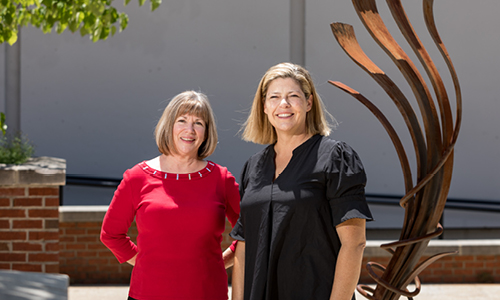WKU News
CHHS implements Wellness Experience to address student needs
- Kristina Harvey
- Thursday, July 21st, 2022

The WKU College of Health and Human Services (CHHS) is spending time this summer preparing to unveil a new student-centered program this fall. Working to address student needs post-pandemic, CHHS is implementing the CHHS Student Wellness Experience. Falling in line with their mission to prepare students to become professionals who will work to improve the quality of life in their communities and beyond, CHHS recognized they must start with improving the quality of life for students while they are on campus. Behind this initiative, Marsha Hopper (featured left) and Amy Wininger (featured right), serve as the student wellness navigators assisting students (especially first-year students transitioning to college life) and teaching CHHS 150: “Enhancing Quality of Life for Health and Human Services Professionals.”
An innovative concept initiated by CHHS Dean Tania Basta, the CHHS Student Wellness Experience is a comprehensive program focused on a wellness wheel, or the eight dimensions of wellness, which include emotional, environmental, financial, intellectual, occupational, physical, social, and spiritual. Using each of these dimensions of wellness as a reference, the navigators serve as resources to help students find their niche on campus, get connected, and experience a better and more balanced quality of life.
According to Dean Basta, “Research suggests that the more engaged first-time students are on campus, the more likely they are to return for their second year. Furthermore, most of our students are being prepared for high-stress careers, so we want to ensure they learn how to take of themselves before they take care of others.” She went on to say, “Our CHHS navigators will meet with students each semester and ensure they are aware of activities and services on campus that meet the eight dimensions of wellness and refer or engage them, as appropriate. If the program is successful, we will increase our first-year retention as well as better prepare our students to take care of themselves in college and life. Faculty can refer a struggling student to our navigators, and they will help engage or refer them for as needed. Navigators are not meant to replace existing services on campus, but to connect students to the available resources.”
“Our mission as student wellness navigators is to encourage students to develop wellness strategies during their time on the Hill, readying them for careers typically high in rates of stress and burn-out,” Wininger shared. “I consider myself to be a coach, a cheerleader, a connector. WKU offers so many campus resources; we simply need to bridge the gap by helping students connect to those resources. In this role, we might encourage a student to join an intramural team, seek counseling services, or run for Student Government. We might guide a student through a financial challenge, recommend a campus art show, or suggest a volunteer activity. We serve as an extra layer of support for students, providing follow-up, encouragement, and guidance.”
For Hopper, the navigator role is all about helping students. “I have a heart for students, for students in transition, and for student success. I had a great college career and I believe that a thriving, active campus is one of the best, safest, and most exciting places to mature, learn, grow, make lifelong friends, network, and solidify career goals for ideal professions.”
As part of the program, Hopper and Wininger will each teach three sections of a newly developed one-hour class for CHHS first-time freshman and transfer students. Hopper shared, “The CHHS 150: “Enhancing Quality of Life for Health and Human Services Professionals” curriculum has a strengths-based approach. I hope with increased awareness and self-reflection, such as identifying old habits, creating new habits, and improving on positive behaviors, students will gain a better sense of themselves. They will become more grounded, come out stronger and wiser, and will hopefully one day want to establish broader connections to their communities and to the world, as well as want to volunteer and give back, as they become more highly educated, confident, and competent.”
Wininger and Hopper hope to make a real difference in the lives of CHHS students by increasing their knowledge, awareness, and skills for living optimally balanced lives. Wininger said, “Our goal is for students to be more resourceful, resilient, and poised to make a difference in their communities after graduation.”
For more information about the CHHS Wellness Experience, visit www.wku.edu/chhs/wellness.php.

